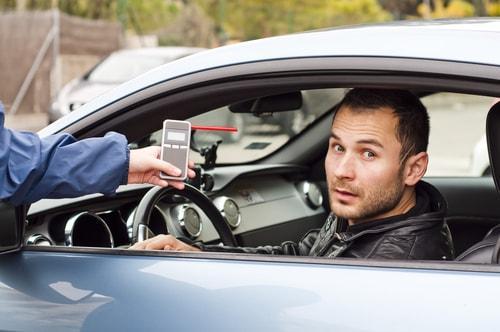Recent Blog Posts
What You Need to Know About Refusing to Take a Breathalyzer
 When a police officer has a reason to suspect that you are driving under the influence of alcohol, the officer may ask to submit to a blood alcohol content (BAC) test. These tests are usually conducted during a traffic stop. The stop may have been initiated based on a minor traffic violation or erratic driving, but if something during the stop triggers the officer’s suspicion, the request for a BAC will usually follow.
When a police officer has a reason to suspect that you are driving under the influence of alcohol, the officer may ask to submit to a blood alcohol content (BAC) test. These tests are usually conducted during a traffic stop. The stop may have been initiated based on a minor traffic violation or erratic driving, but if something during the stop triggers the officer’s suspicion, the request for a BAC will usually follow.
The most common type of BAC test—and the easiest to conduct—is a breath test. BAC breath tests are usually known simply as "breathalyzer" because of a particular brand of testing machine that has become synonymous with the test. You probably know that if you blow a 0.08 or higher on your breathalyzer, you are considered to be statutorily intoxicated and can be charged with driving under the influence (DUI). But, do you have to take the test when you are asked to do so?
Can I Still Get a DUI If My BAC is Under the Legal Limit?
 Being found guilty of driving under the influence (DUI) can have devastating effects on an individual’s life. Those found guilty of drunk driving can face steep fines, loss of driving privileges, community service, and even jail time. Most people have heard that 0.08 is the magic number when it comes to being legally intoxicated behind the wheel. However, there are several circumstances where a person can be in violation of the law when driving a car with a blood alcohol content which is under the legal limit.
Being found guilty of driving under the influence (DUI) can have devastating effects on an individual’s life. Those found guilty of drunk driving can face steep fines, loss of driving privileges, community service, and even jail time. Most people have heard that 0.08 is the magic number when it comes to being legally intoxicated behind the wheel. However, there are several circumstances where a person can be in violation of the law when driving a car with a blood alcohol content which is under the legal limit.
Illinois Per Se DUI Laws
The reason it seems that 0.08 is the magic number when it comes to DUIs is because driving with a blood alcohol content (BAC) of 0.08 or more is considered "per se intoxicated." "Per se" laws establish that if someone is operating a vehicle and is found to have a BAC over the 0.08 limit, that no other evidence is necessary to prove a driver’s intoxication. However, a BAC at or above the legal limit is not always necessary for a DUI conviction.
Why You Should Not Consent to a Vehicle Search
 It can be hard to know exactly what your rights are when it comes to police searches. Under federal law, police may only search homes and vehicles under certain circumstances. If a police officer wishes to search your home, he or she will usually need to acquire a search warrant before entering the property. Cars, trucks, motorcycles, and other motor vehicles do not always necessitate a search warrant. One way police may legally search a person’s vehicle is if the driver gives them permission to do so. Most legal experts believe that citizens should never give police permission to search their vehicle—even if they have nothing to hide.
It can be hard to know exactly what your rights are when it comes to police searches. Under federal law, police may only search homes and vehicles under certain circumstances. If a police officer wishes to search your home, he or she will usually need to acquire a search warrant before entering the property. Cars, trucks, motorcycles, and other motor vehicles do not always necessitate a search warrant. One way police may legally search a person’s vehicle is if the driver gives them permission to do so. Most legal experts believe that citizens should never give police permission to search their vehicle—even if they have nothing to hide.
When Police May Search Your Car
The Fourth Amendment to the United States Constitution protects American citizens from unreasonable searches and seizure of personal property. In order to legally search a vehicle, police must have a valid reason, a search warrant, or the driver’s permission. More specifically, police may lawfully search a vehicle only if:
You Have Been Charged with Reckless Driving; Now What?
 Generally, traffic violations are considered only civil offenses. Things like driving a few miles above the speed limit, a rolling stop at a stop sign, or failing to use your turn signal can result in a ticket and associated fines but are not considered actual crimes. Motorists should know that some traffic violations are considered much more dangerous and therefore come with a much harsher penalty. If you have been charged with reckless driving, you may be facing a misdemeanor conviction and even jail time.
Generally, traffic violations are considered only civil offenses. Things like driving a few miles above the speed limit, a rolling stop at a stop sign, or failing to use your turn signal can result in a ticket and associated fines but are not considered actual crimes. Motorists should know that some traffic violations are considered much more dangerous and therefore come with a much harsher penalty. If you have been charged with reckless driving, you may be facing a misdemeanor conviction and even jail time.
What is Considered Reckless Driving?
You have probably heard the phrase "reckless driving" before but may be unsure of its exact meaning. According to Illinois law, someone is reckless driving if they
- Drive a vehicle with deliberate disregard for property and others’ safety; or
- Intentionally use an incline in the roadway to cause a car to become airborne.
DUI Checkpoints: What Are Your Rights?
 According to the National Highway Safety Administration, a person dies in a drunk driving-related accident every 50 minutes in the United States. In order to catch those who drink and drive, Illinois police sometimes use DUI checkpoints. These checkpoints usually involve some sort of roadblock which prevents motorists from passing. Police may stop vehicles and ask drivers to perform field sobriety tests or submit to chemical testing, such as a Breathalyzer test. Many individuals are unsure of what their rights are at a DUI checkpoint. Read on to learn what is expected of both motorists and police at these stops.
According to the National Highway Safety Administration, a person dies in a drunk driving-related accident every 50 minutes in the United States. In order to catch those who drink and drive, Illinois police sometimes use DUI checkpoints. These checkpoints usually involve some sort of roadblock which prevents motorists from passing. Police may stop vehicles and ask drivers to perform field sobriety tests or submit to chemical testing, such as a Breathalyzer test. Many individuals are unsure of what their rights are at a DUI checkpoint. Read on to learn what is expected of both motorists and police at these stops.
Probable Cause for Stopping Vehicles
If you are someone with a basic understanding of the law, you may have wondered how police checkpoints are even legal. After all, the U.S Constitution does have rules which prevent police from unreasonable search and seizure. The Fourth Amendment says that "The right of the people to be secure in their persons, houses, papers, and effects, against unreasonable searches and seizures, shall not be violated, and no Warrants shall issue but upon probable cause..." This right to be free from arbitrary seizure of property includes being pulled over while driving. Technically, a police officer does need probable cause to pull someone over and ask them to perform a sobriety test. However, in the case of DUI checkpoints, an exception has been made. The U.S. Supreme Court has determined that the intrusiveness of DUI checkpoints is outweighed by the benefit of decreasing the number of drunk drivers on the road.
Decriminalized Marijuana Leaves Open Questions About Drug Paraphernalia
 By now, you probably know that low-level possession of marijuana is no longer a criminal offense in Illinois. The possession of less than 10 grams is a civil offense punishable by a fine of up to $200—similar in most regards to a traffic violation. Illinois, however, has maintained its statute regarding the possession of drug paraphernalia. While the law was amended to account for the new guidelines on marijuana possession, loopholes still exist that could land a person in serious trouble.
By now, you probably know that low-level possession of marijuana is no longer a criminal offense in Illinois. The possession of less than 10 grams is a civil offense punishable by a fine of up to $200—similar in most regards to a traffic violation. Illinois, however, has maintained its statute regarding the possession of drug paraphernalia. While the law was amended to account for the new guidelines on marijuana possession, loopholes still exist that could land a person in serious trouble.
What the Law Says
The Illinois Drug Paraphernalia Control Act makes it illegal to possess products, equipment, or materials that are intended to be used in producing, preparing, testing, hiding, or using controlled substances, including marijuana. (Technically, equipment for making methamphetamine is covered under a separate statute but is still illegal.) The drug paraphernalia law covers a wide variety of products, including but not limited to:
What You Need to Know About Criminal Charges for Assault
 Like many legal terms, people often use the word assault incorrectly. Although it is used casually to refer to aggressive or violent behavior, the Illinois Criminal Code defines the offense much more specifically. If you have been charged with assault, you are probably unsure of what to do next. The best start to effective criminal defense is educating yourself about your charges. If you are facing assault charges, read on to learn what exactly you are up against.
Like many legal terms, people often use the word assault incorrectly. Although it is used casually to refer to aggressive or violent behavior, the Illinois Criminal Code defines the offense much more specifically. If you have been charged with assault, you are probably unsure of what to do next. The best start to effective criminal defense is educating yourself about your charges. If you are facing assault charges, read on to learn what exactly you are up against.
Assault and Battery Defined
The colloquial definition of assault usually refers to some type of physical altercation between individuals. What many think of as assault is actually two separate offenses according to the Illinois Criminal Code: assault and battery. The legal meaning of assault can only be completely understood when one considers the definition of battery.
Battery refers to instances when a person intentionally and without reason "(1) causes bodily harm to an individual or (2) makes physical contact of an insulting or provoking nature with an individual." Battery can include things like a fist fight in a bar, slapping someone’s face, or even something as simple as poking someone in the chest with the intention of provoking them. Assault, in the legal sense, includes the threatening actions which precede aggressive or unwanted physical contact. More precisely, assault occurs when an individual is in "reasonable apprehension of receiving a battery."
Drug Dealer Peddling Elephant Tranquilizer Pleads Guilty
 We have discussed the dangers of the synthetic opioid fentanyl in previous posts. The extremely potent substance is significantly stronger than heroin or morphine and is responsible for thousands of overdose deaths each year. Many individuals have died after using heroin which was secretly laced with fentanyl. Only three milligrams of the powder is enough to kill a grown man. The enormously unsafe nature of fentanyl has even led to legislation which allows drug dealers who sell fentanyl-laced products to be charged with homicide. However, a new synthetic opioid which is even more potent than fentanyl is now being discovered in homes across the United States, and lawmakers are responding sternly.
We have discussed the dangers of the synthetic opioid fentanyl in previous posts. The extremely potent substance is significantly stronger than heroin or morphine and is responsible for thousands of overdose deaths each year. Many individuals have died after using heroin which was secretly laced with fentanyl. Only three milligrams of the powder is enough to kill a grown man. The enormously unsafe nature of fentanyl has even led to legislation which allows drug dealers who sell fentanyl-laced products to be charged with homicide. However, a new synthetic opioid which is even more potent than fentanyl is now being discovered in homes across the United States, and lawmakers are responding sternly.
Carfentanil is a Deadly Synthetic Opioid
While fentanyl continues to be a massive public health concern, Carfentanil has even more sinister implications. The substance was originally engineered to be an elephant tranquilizer, but some people are now risking their lives by using it recreationally. The drug’s extreme toxicity has even provoked concerns that terrorists could use it as a weapon of mass destruction. Needless to say, law enforcement and legislators are paying close attention to this drug.
Experts Suggest Medical Marijuana May Curtail Opioid Abuse Epidemic
 Opioid abuse has become a major public health crisis in recent decades. Many individuals become addicted to opioids after being prescribed drugs such as codeine, hydrocodone, OxyContin, or Percocet to manage extreme pain. Opioids are extremely addictive, and when a person continually takes these drugs, they eventually need more and more to feel the same pain-relieving effects. Many people become addicted to pain pills and then end up turning to heroin or fentanyl. Each day, an estimated 155 people lose their lives to opioid overdose. Some experts believe that medical cannabis could be the key to reducing the staggering number of opioid overdose deaths.
Opioid abuse has become a major public health crisis in recent decades. Many individuals become addicted to opioids after being prescribed drugs such as codeine, hydrocodone, OxyContin, or Percocet to manage extreme pain. Opioids are extremely addictive, and when a person continually takes these drugs, they eventually need more and more to feel the same pain-relieving effects. Many people become addicted to pain pills and then end up turning to heroin or fentanyl. Each day, an estimated 155 people lose their lives to opioid overdose. Some experts believe that medical cannabis could be the key to reducing the staggering number of opioid overdose deaths.
Studies Compared States with Legalized Medical Marijuana in States Without Legalized Marijuana
Recently, two studies regarding the medicinal benefits of cannabis were published in the journal JAMA Internal Medicine. Researchers compared opioid prescription frequency for states which have allowed the legal use of marijuana to those states which have not adopted legalized cannabis. One study analyzed opioid prescriptions covered by Medicare Part D and the other considered opioid prescriptions covered by Medicaid.
When Is an Illinois DUI is Considered a Felony?
 In Illinois, there are three classifications of criminal offenses. Petty offenses are the lowest classification and include most traffic violations. The next level of offense a misdemeanor while the highest classification of crime, that which can carry the most serious penalties, is a felony. Those convicted of a felony usually face extended imprisonment as well as other serious punitive consequences. There are some instances in which a charge of driving under the influence (DUI) can be classified as a felony. Felony DUIs, also called aggravated DUIs, carry more severe disciplinary consequences than a misdemeanor DUI does and can seriously affect a convicted person’s ability to find employment or even a home in the future.
In Illinois, there are three classifications of criminal offenses. Petty offenses are the lowest classification and include most traffic violations. The next level of offense a misdemeanor while the highest classification of crime, that which can carry the most serious penalties, is a felony. Those convicted of a felony usually face extended imprisonment as well as other serious punitive consequences. There are some instances in which a charge of driving under the influence (DUI) can be classified as a felony. Felony DUIs, also called aggravated DUIs, carry more severe disciplinary consequences than a misdemeanor DUI does and can seriously affect a convicted person’s ability to find employment or even a home in the future.
Most DUI Charges Are Considered Misdemeanors
If you are an Illinois resident have been charged with a DUI for the very first time, you will almost certainly be charged with a misdemeanor. Felony DUI charges come as a result of more serious violations of the law. Offenses which can result in a felony DUI charge include:







